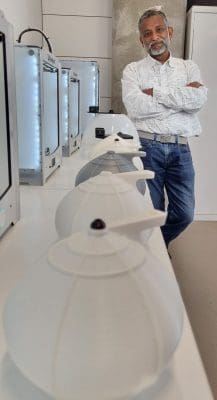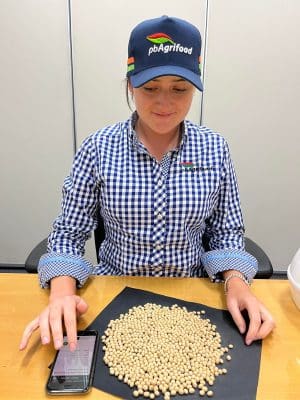ARTIFICIAL intelligence (AI) company GoMicro is rolling out its new grain-assessment technology in Australia, paving the way for more consistent quality controls and stable grain and pulse prices.
Its multi-grain assessor can accurately test more than 1200 grains in one sample.
This compares with the existing scanner-based method which assesses about 200 well-separated grains at a time.
GoMicro is based in Singapore and also at Flinders University’s New Venture Institute (NVI) at Tonsley Innovation District in Adelaide.

GoMicro CEO Dr Sivam Krish. Photo: Flinders University
GoMicro CEO Sivam Krish said the multi-grain assessor provides growers and those in domestic and export markets a faster and more accurate means of grading grain and pulses.
“GoMicro relies on the excellent quality of phone cameras and Amazon web services to deliver low-cost, high-precision quality grain and other produce assessments to farmers worldwide,” Dr Krish said.
GoMicro’s grain-assessment technology is also being trialled on wheat grown in India, and corn grown in Ghana.
Negotiations are well advanced to expand the assessor rollout with a large Indian ag-tech company for use in grain, corn and soy procurement.
“Accurate verifiable assessment will greatly reduce quality-related assessment risks for all parties in the supply chain.”
The new system reduces the risk of wasted production and trade disputes which often involve more subjective human quality assessment.
The technology is already being trialed by one Australian company.
“This direct digital manufacturing facility…is working with Queensland grain, seed and pulse trader PB Agrifood to assess the quality of soybeans sold by local farmers.”

GoMicro is being used by PB Agrifood’s Kate McIntyre to assess grain. Photo: Flinders University
PB Agrifood field officer Kate McIntyre said the Toowoomba-based company hoped the GoMicro Assessor will be used in day-to-day operations, making digitisation solutions accessible to the company as well as growers to produce fair pricing based on objective assessment.
“When PB Agrifood heard about Go Micro and the use of AI technology to classify grain and pulses, we thought about how this technology could improve efficiency and accuracy in our intake of soybeans,” Ms McIntyre said.
“We believe that the implementation of the technology developed by GoMicro will allow us to establish the quality of the soybeans at intake more quickly and accurately.”
PB Agrifood has several uses for soybeans including whole beans, flour, kibble and meal, and each requires different standards of soybeans.
Currently, PB Agrifood staff manually categorise these soybeans based on the relevant standards.
The GoMicro technology assesses the soybeans into five categories and creates a table of results for each defect, including the percentage of defective beans in each category.
“It will enable us to match these percentages to our intake standards and categorise the beans.”
“We are still implementing the technology into our intake process with a few changes to be made.
“For example, our current standards work off a weight sample whereas with the GoMicro app, the sample will be based on the number of individual beans.
“We hope that the technology will result in growers getting a fairer and faster categorisation of their soybeans.”
Dr Krish said the GoMicro technology has potential for farmers to capitalise on low-cost, high-quality grain assessments to transform entire harvests into digital assets that can be traded online.
“We are looking at yet more design and AI features to achieve optimal imaging conditions rapidly, even in the field,” Dr Krish said.
“We look forward to making our phone-based AI assessment technology affordable and available to the entire grain industry.”
GoMicro has developed a range of phone-camera techniques and flexible web-based and artificial intelligence (AI) technologies to via pest and food-product surveillance and now the new grain, pulses, coffee and tea assessment method for farmers and consumers around the world.
GoMicro is one of around 30 small businesses and entrepreneurs incubated at the NVI which have access to various experts, resources and networks at Flinders University to help deliver effective solutions to clients.
Companies range from traditional and advanced manufacturing to AI, big data analytics, web development and product design and healthcare, aged care, marketing and brand development.
Source: Flinders University

I’m interested in the QC potential of your phone technology